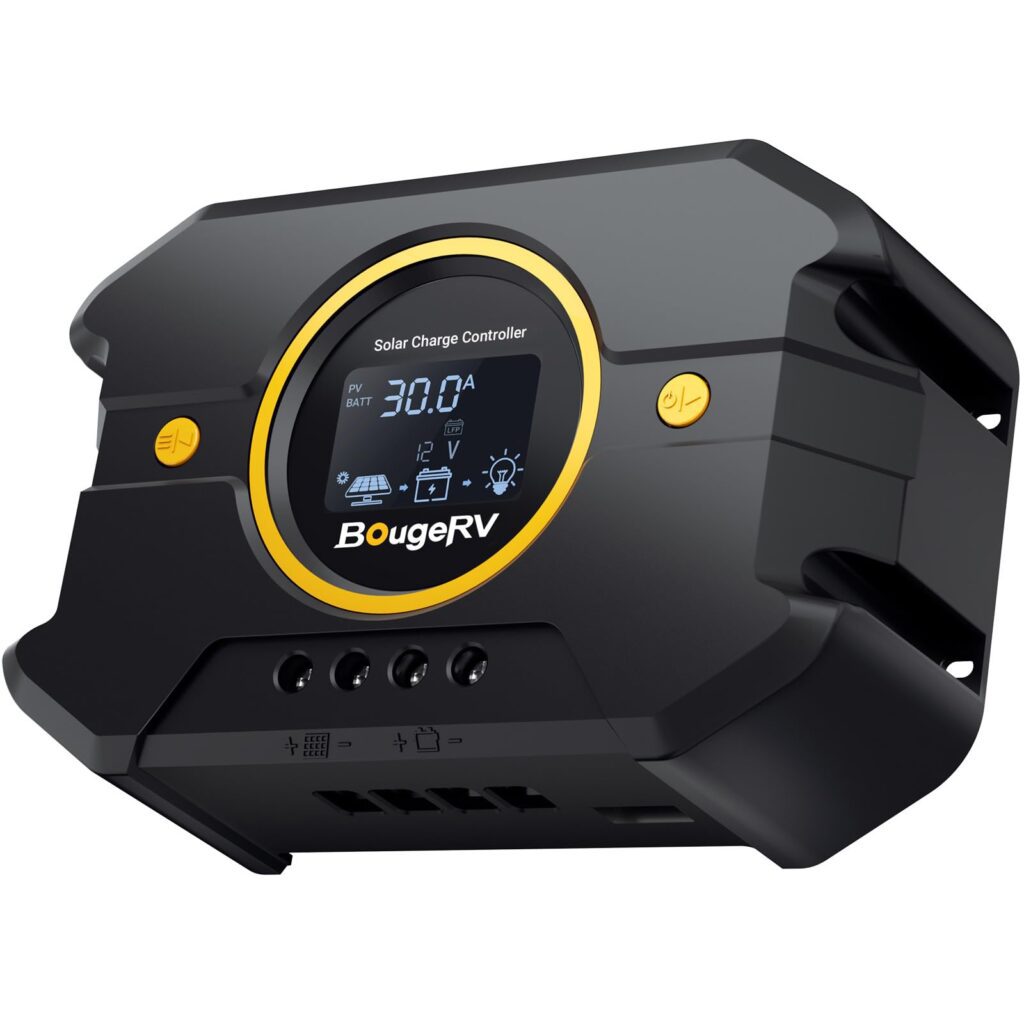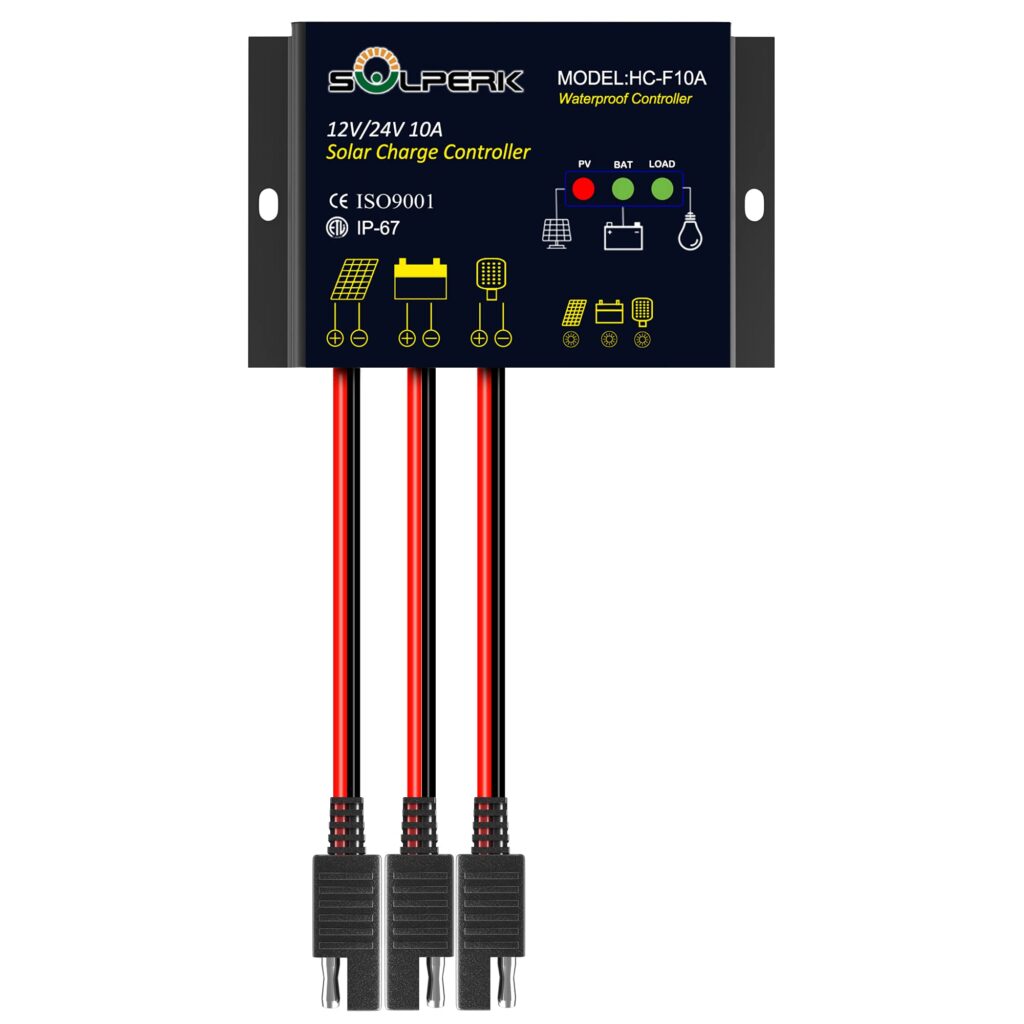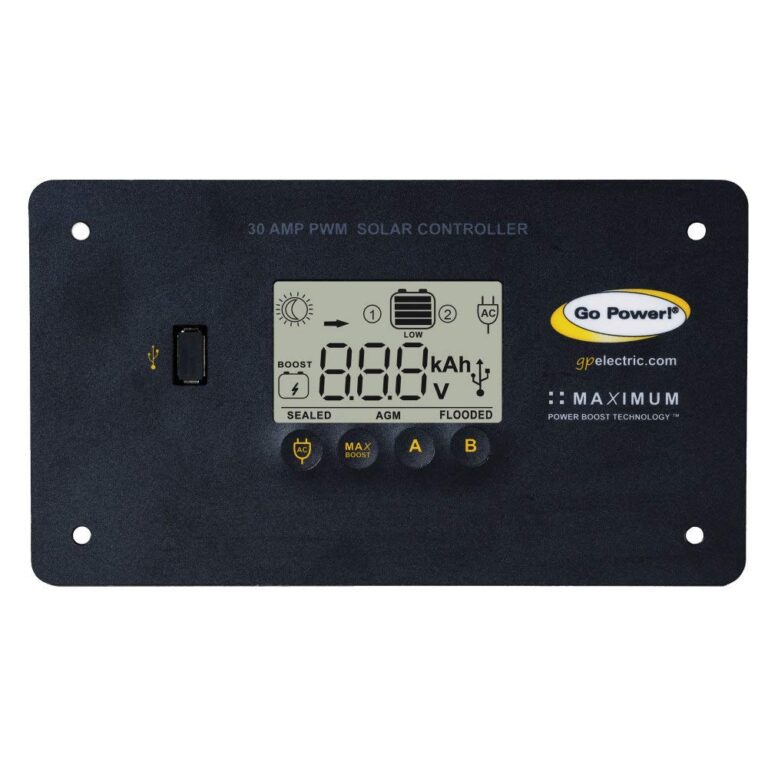Harnessing solar power to energize your RV not only helps in reducing your carbon footprint but also saves on energy costs. A significant component in this process is the solar charge controller, which regulates the flow of electricity from solar panels to your RV batteries. This ensures that your batteries are charged efficiently, thereby prolonging their life and optimizing your solar system’s performance.
When it comes to RV solar charge controllers, you have two main types to choose from: Pulse Width Modulation (PWM) and Maximum Power Point Tracking (MPPT). While both serve the primary function of protecting your batteries from overcharging, MPPT controllers are more efficient and deliver better performance. However, they also come with a higher price tag. Ultimately, your choice depends on your RV solar system’s size, your energy needs, and your budget.
Before making a purchase, it’s crucial to consider factors like controller type (PWM or MPPT), amps and voltage ratings, ease of installation, and additional features such as a built-in display or remote monitoring. Understanding these aspects will help you make an informed decision, ensuring that you invest in a solar charge controller that’s compatible with your solar setup and serves your RV’s energy needs efficiently.
Armed with this knowledge, let’s dive deeper into what makes an exceptional RV solar charge controller, discussing the benefits and features that will make your RV journey more sustainable and enjoyable.
Best RV Solar Charge Controllers
Looking for the perfect RV solar charge controller to keep you powered up and ready to go on your next adventure? We’ve got you covered! Below is a comprehensive list of the best RV solar charge controllers on the market. Trust us, these products are essential to help you keep your energy usage in check, and your batteries charged for the long haul. So, let’s dive in and explore our top picks!
Renogy Voyager 20A Solar Charge Controller

The Renogy Voyager 20A is a top choice for those seeking a durable and efficient solar charge controller for their RV.
Pros
- Advanced 4-stage PWM technology
- IP67 rated waterproof design
- Compatibility with various battery types
Cons
- Instruction manual lacks clarity
- No USB port
- Potential issues with the waterproof feature
The Renogy Voyager 20A is a class-leading 20-amp charge controller that boasts an IP67 rating, making it perfect for outdoor use as it can endure water spray, rain, and condensation. Its advanced PWM technology provides high charging efficiency and supports both 12V and 24V off-grid applications. The controller is compatible with four different battery types, including Lithium Iron Phosphate, ensuring versatility.
Equipped with solar panel, battery, and controller protections, the Voyager 20A guarantees the longevity of your system. Its backlit LCD display offers accurate and up-to-date information regarding charging current, generated energy, temperature, battery voltage, and error codes. This feature allows users to have better control and monitoring of their charging process.
Despite these advantages, there are a few drawbacks to the Renogy Voyager 20A. Some customers mentioned that the instruction manual is unclear, making installation and usage slightly confusing. Thus, it may be necessary to look for additional resources to get the most out of this product. Additionally, the 20A version does not come with a USB port, unlike the 10A counterpart, which may be disappointing to some users.
The waterproof feature, albeit highly attractive, has raised concerns among a few users as water may accumulate under the LCD screen. It’s important to monitor this aspect and reach out to Renogy if any issues arise.
Overall, the Renogy Voyager 20A Solar Charge Controller presents an excellent option for those looking to purchase a reliable and efficient charge controller for their RV, despite a few minor drawbacks. Its advanced technology, waterproof design, and compatibility with different battery types make it a strong contender in the market.
Go Power! Solar Controller

The Go Power! Solar Controller is a top choice for protecting your solar battery while enjoying energy efficiency in your RV.
Pros
- Versatile compatibility – suitable for lithium, wet cell, AGM, and gel batteries
- Supports 4-stage battery charging process
- Can handle up to 570 watts of solar input
Cons
- Pricier compared to some competitors
- Bluetooth app can be unreliable at times
- May not provide accurate battery voltage readings initially
The Go Power! Solar Controller offers a reliable way to manage and prolong the life of your solar batteries. Designed to work with a wide range of battery types, this 30-amp digital solar controller is perfect for RV users who need their solar energy system to be highly adaptable and efficient.
Our favorite feature is the 4-stage battery charging process, which ensures optimal charging for your specific battery type. This not only maximizes the efficiency of your solar panels but also protects against overcharging and potential battery damage.
However, we noticed that the Bluetooth app seems to have some issues with connectivity and could be more user-friendly. Additionally, some users have reported slightly inaccurate battery voltage readings when they first install the controller. This generally resolves itself after some usage and fine-tuning adjustments based on the manual’s recommendations.
In conclusion, the Go Power! Solar Controller is a solid investment for those seeking a high-quality, versatile solar charge controller for their RV. Though it may be a bit pricier than some other options, its adaptability and overall performance make it a worthwhile choice.
BougeRV Li 30A PWM Solar Charge Controller

This BougeRV PWM Solar Charge Controller is a great option for those looking for an easy-to-use, versatile, and reliable solution for their RV solar setup.
Pros
- Easy-read backlit display
- Compatibility with various lithium batteries
- Supports solar panel input up to 55 volts
Cons
- Not an MPPT controller
- May not fully utilize solar panel’s maximum voltage
- Limited to 30A input
BougeRV’s Li 30A PWM Solar Charge Controller features an easy-to-read backlit display, perfect for checking your RV’s solar panel status and battery condition. The display cycles between the photovoltaic input current and battery voltage every 3 seconds, making it extremely convenient to monitor your system’s status. Additionally, the charge controller is compatible with various 12V or 24V batteries, including lithium batteries. This makes it an excellent choice for those looking to upgrade their lithium-ion batteries without needing to purchase a new controller.
One of the main drawbacks of this charge controller is that it’s not an MPPT (Maximum Power Point Tracker) controller, which are generally more efficient than PWM (Pulse Width Modulation) controllers. As a result, you might not be able to utilize your solar panel’s maximum voltage. However, the BougeRV controller still offers a high PV input voltage of 55V, capable of handling 4500 watts input for 12V battery systems and 900 watts input for 24V systems.
With the BougeRV Li 30A PWM Solar Charge Controller, you can achieve neat and safe wiring thanks to the included spade terminals. Just make sure to follow the proper wiring order to avoid any issues. Overall, this solar charge controller is an excellent choice for those looking for a user-friendly, versatile, and reliable option for their RV solar setup.
Keep in mind, however, that the charge controller is limited to a 30A input, so if your solar setup requires higher input, this might not be the right option for you. Despite this limitation, this BougeRV charge controller remains a solid choice for those in need of a dependable solution for their RV solar system.
SOLPERK 10A Solar Charge Controller

An excellent choice for your RV solar charge controller needs because of its user-friendly features and balanced performance.
Pros
- Waterproof and suitable for outdoor use
- Intelligent 3-stage PWM charging technology
- Simple installation with SAE port and pre-drilled holes
Cons
- Limited to 10A of maximum current
- Bright LEDs may drain battery overnight
- Some users experienced short lifespans
The SOLPERK 10A Solar Charge Controller is a waterproof and robust solution for your RV solar charge controller needs. Its IP67 waterproof rating ensures it’s safe to use outdoors, while its compatibility with 12V and 24V deep-cycle batteries makes it versatile as well. Additionally, this solar charge controller is beginner-friendly as it automatically identifies voltage and easily connects via its SAE port.
One of the most significant advantages is its intelligent 3-stage PWM charging technology. This feature not only enhances the charging efficiency but also extends the battery life and improves the overall performance of your RV solar system. In terms of protection, this controller is designed with multiple safeguards, including battery under-voltage, over-voltage, output overload, and short circuit protection.
Despite its numerous benefits, there are a few drawbacks to consider as well. The SOLPERK 10A Solar Charge Controller is limited to 10A of maximum current, which may not be ideal for larger solar setups. Furthermore, some users have mentioned that the bright LEDs on the controller can drain the battery overnight if not monitored. A small percentage of users experienced shorter product lifespans than expected.
In conclusion, the SOLPERK 10A Solar Charge Controller is a user-friendly and efficient option for controlling your RV solar charge needs. Its waterproof design, intelligent charging technology, and easy installation make it a top choice among other controllers. However, be aware of its limitations when considering it for your RV solar system.
Buying Guide
Well, since we’re all friends here, let’s chat about how to choose the best RV solar charge controller for our needs! No need to worry, we’ll break it down into manageable chunks and guide you through the process.
First things first – we need to consider the type of solar charge controller. There are two main types: Pulse Width Modulation (PWM) and Maximum Power Point Tracking (MPPT). In a nutshell, PWM controllers are more affordable but less efficient, while MPPT controllers are more efficient and versatile but can be pricier. So it’s important to determine what fits our budget and efficiency needs.
Next up, let’s talk about the size of the controller. We need to match it with the solar panel system we plan on using. A general rule of thumb is to take the total watts of our solar panels and divide that by the voltage of our battery system. This calculation will give us the necessary amperage capacity for the charge controller. Yeah, we did a little math, but it’s worth it to make sure we find the right fit!
Another essential factor to consider is the controller’s features. Here are some key points we should be looking at:
- Ease of installation and use: We want a controller that’s straightforward and not too complicated, especially if we aren’t solar experts.
- Display and monitoring: It’s important to monitor our system’s performance. Look for a controller with an informative and user-friendly display.
- Battery compatibility: Make sure the controller works with the type of battery we have (e.g., lead-acid, lithium, etc.)
- Protection Features: Since we care about our system’s safety, look for controllers with essential protection features such as overcharge, short circuit, and reverse polarity protection.
There’s a lot to think about, but with these factors in mind, we’re well on our way to finding the perfect RV solar charge controller for our needs. May the sun be ever in our favor!
Frequently Asked Questions
How do I choose the right solar charge controller for my RV?
To choose the right solar charge controller for your RV, first, determine the solar panel wattage and the battery system voltage. Then, divide the total solar panel wattage by the battery system voltage to get the required amperage rating. Make sure to choose a controller that has a higher amperage rating than your calculated needs. Consider your budget and opt for a reputable brand to ensure reliability.
What are the differences between MPPT and PWM charge controllers?
MPPT (Maximum Power Point Tracking) charge controllers are more advanced and efficient. They can convert excess voltage into amperage, allowing for better overall performance. On the other hand, PWM (Pulse Width Modulation) charge controllers are simpler, less expensive, and work well in smaller systems. However, they are less efficient than MPPT controllers, especially in low-temperature environments.
How do I determine the required size of my RV’s solar charge controller?
To determine the required size of your RV’s solar charge controller, divide your solar panel array’s total wattage by your battery bank voltage. This will give you the required current rating for your solar charge controller. Make sure to choose a controller with a higher current rating to accommodate future expansions and ensure proper function.
How can I connect a solar charge controller to my RV’s battery bank?
To connect a solar charge controller to your RV’s battery bank, follow these simple steps:
Mount the solar charge controller in a location close to your battery bank and with appropriate ventilation.
Connect the positive and negative wires from the solar panels to the designated terminals on the solar charge controller.
Connect the positive and negative wires from the battery bank to the battery terminals on the solar charge controller.
Ensure all connections are secure and double-check polarity.
Always refer to the manufacturer’s instructions and guidelines for proper installation.
Do I need a separate inverter when using an RV solar charge controller?
Yes, a separate inverter is required when using an RV solar charge controller. The charge controller regulates the flow of power from the solar panels to the battery bank, while an inverter converts the stored DC power from the batteries into AC power, which can be used to run your RV electronics and appliances. Make sure to choose an inverter that matches your system’s size and power requirements.

